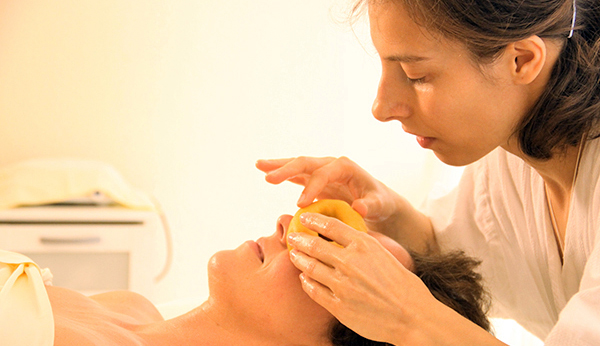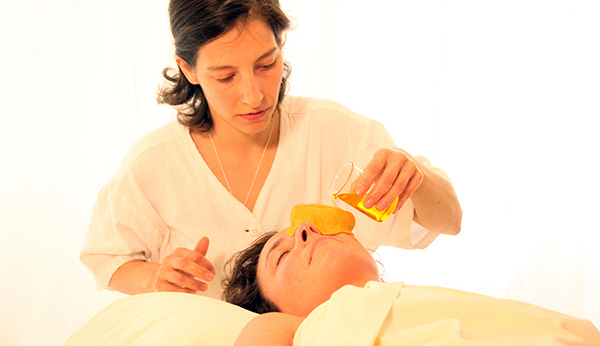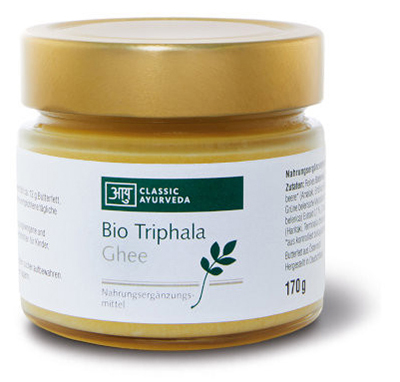Our eyesight is regarded as the most important of the five senses of perception: sight, hearing, smell, taste, and touch. Our eyes are indispensable for comprehending the world in which we live.
They capture light impulses as visual impressions and pass them on to the brain for further processing.
The classical texts frequently emphasize how important our eyesight is and that we should well protect and care for our eyes throughout life. While western medical systems often study the eyes from an isolated point of view, in Ayurveda the focus is on the holistic approach, taking into account the predominant Doshas, the Dhatus (body tissues) and the Agnis (digestive fire).
In particular, attention is paid to the digestive fire, as inadequate processing of ingested food can lead to an accumulation of Ama (toxins) and consequently affect all body systems.
Broadly speaking, the eyes are associated with Pitta Dosha. Each Dosha has five Subdoshas, each having specific functions and associated with certain organ systems. The Subdosha responsible for the eyes is called Alochaka Pitta Dosha. Well-functioning Alochaka Pitta ensures good vision, correct perception, and recollection of images from the past.
In the classical texts, the main reasons for eye diseases are enumerated as: unhealthy lifestyle, lack of sleep, suppression of physical needs such as sneezing or yawning, and high exposure to dust and smoke.

Reasons for eye irritation and deteriorating eyesight
From the age of forty, Alochaka Pitta usually becomes weaker gradually, which can lead to impaired eyesight and other eye problems during the second half of life. Then ailments like strained, dry or burning eyes come up, especially in people who spend extended periods at computers and screens, who drive a lot, or who live in cities with high levels of air pollution.
Let’s look at this in connection with the Doshas: Dryness of the eyes may be related to Vata Dosha. Red, burning eyes indicate an excess of Pitta Dosha. People with Pitta imbalance also tend to experience burning sensations in other areas of the body, such as heartburn in the stomach and esophagus. And an excess of Kapha Dosha can manifest as deposits in and around the eye.
The eyes are intimately connected with the liver, which is why yellow eyes can be seen in severe liver disorders. If the liver is overburdened and Pitta Dosha stagnates or rises sharply, the eyes are good indicators, providing helpful clues for diagnosis.
Ayurveda frequently points out that too much or one-sided use of the sensory organs leads to illness, so it is important to take care of the eyes and give them rest regularly.
Preventing eye problems
To benefit one’s eyes, the first thing one can do is to follow the principles of a healthy lifestyle. A balanced lifestyle with a varied, plant-based diet, sufficient sleep and a healthy daily routine is the basis for good health. When the Doshas are in balance, all areas of the body are enhanced, and so are the eyes. You can support your body in creating balance by taking Triphala before sleeping and by regularly using Ghee. Triphala balances all three Doshas and helps to remove waste products from the intestines. At the same time, it has a positive effect on the liver and reduces high cholesterol. When used regularly, its specific effect on eye health can even prevent the development of cataract and glaucoma.
Also the consumption of berries, which are chock-full of antioxidants, and nuts contributes to the maintenance of good eyesight.
Have you ever looked closely at cut carrots? Their cross-section looks like an eye! Carrots contain high levels of beta-carotene, a precursor to vitamin A, which is important for visual acuity and helpful against night blindness. According to nutrition studies, at least 25% of the German population is deficient in vitamin A, so this fact should also be taken into account when eyesight is deteriorating.

Sunglasses in all shapes and colors have become fashionable in recent decades. In strong light, such as in high summer, in the mountains, or on the water, this can be very helpful in protecting your eyes from too much light. When picking a color, it’s good to choose dark gray, brown or green glasses. Red or yellow glasses enhance Pitta Dosha. Blue and purple glasses should certainly be avoided, as they accentuate the sun’s ultraviolet rays and can thus cause long-term damage to your retina and lens. Also, only wear your sunglasses in strong light: using them for extended periods weakens the eyesight.
General eyecare tips
- Take enough breaks: If your daily routine involves a lot of screen work, take a few minutes every 1–2 hours to give your eyes some rest. To do this, rub your hands together quickly until they become warm. Then place your warm palms over your closed eyes and apply gentle pressure on the eyelid. Your eyes will feel noticeably better already after a minute.
- Change of focus: If you read a lot or work with things at close range, you should take a little break every 30 minutes to look into the distance and relax your eye muscles. Regularly, from time to time, direct your gaze out of the window and into the distance.
- A quick refresher: Whenever you wash your hands, also briefly sprinkle your eyes with cool, clear water.
- Taking care of your eyes during the night: Put a drop of Triphala Ghee in each eye before going to bed. You can massage any excess Ghee into the surrounding skin with the eyes closed. If you don’t have Triphala Ghee, you can also use ordinary Ghee. Always maintain clean conditions and don’t go into the Ghee container with your fingers.
- Preparing eyedrops yourself: For this you’ll need 150 ml of distilled water and 5 drops of pure rose water (for example, from the pharmacy). Mix both ingredients and wash the eyes with it. In addition, you can also use an eyedropper to put rose water onto the conjunctiva. Rose is very balancing for excessive Pitta Dosha and soothes the eyes immediately.
- Avoid blue light: Light is a very underestimated factor for our brain and hormonal balance. Blue light is present in sunlight during the day, but decreases greatly towards evening. That’s exactly how it should be in your home, too. In the evening, relieve the strain on your eyes and help your hormonal system by using warm filters and incandescent light bulbs instead of LED lights. (By the way: there are already glasses with invisible, integrated warm filters available at opticians.) It will both prevent problems with falling asleep and improve your sleep quality.
- Use sunglasses in moderation: As described above, you should not wear sunglasses permanently, but only when it is very bright in the summer.
If you follow the above tips, you have already done your eyes a great favor. These suggestions can quickly and easily be integrated into your daily routine. Regular Ayurvedic fasting cures such as Ama reduction cures as well as Panchakarma are also suitable as supportive and preventive measures.
In a Panchakarma course of treatment, the digestive fire can be strengthened again. Ghee and external applications and massages are used to mobilize excess Doshas, which are then eliminated effectively. There is also a treatment called Netra Tarpana, which is a detoxifying and restorative therapy specifically for our precious eyesight. Have a look on our homepage and let us provide you with some inspiration.


Netra Tarpana – Ayurvedische Augenbehandlung
Download the article as a PDF file
© Maharishi AyurVeda Health Centre Bad Ems


This has been very helpful since I’ve had eye problems in the past and want to prevent these from reoccurring.
thank you so much, very opportune, grateful for this, as my sight has been a huge gift aiding my perception.